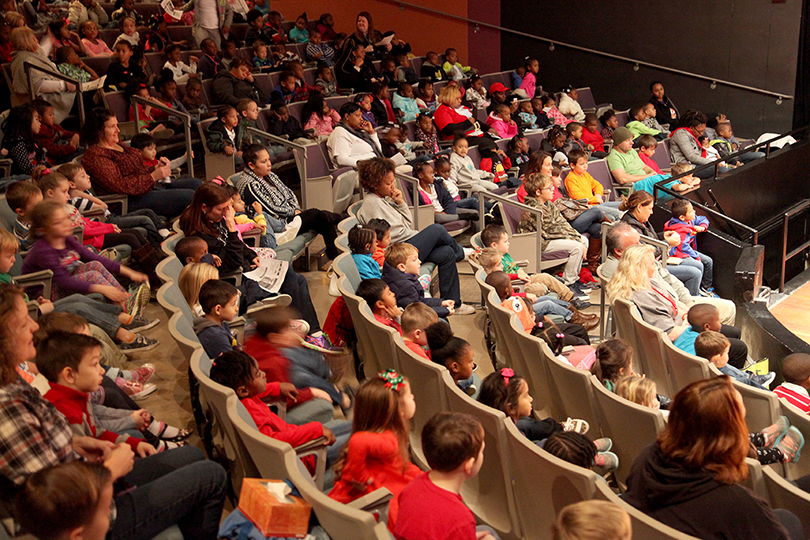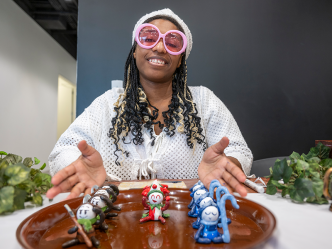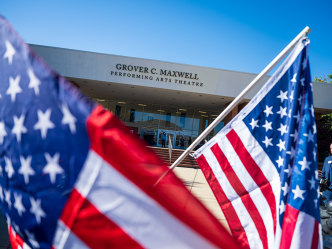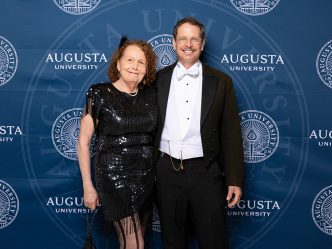The Grover C. Maxwell Performing Arts Theatre on Augusta University’s Summerville campus can hold 740 people.
On Oct. 11, 2017, the Literacy Center hosted a play titled, “HAM Radio: A S.T.E.A.M Show,” that had over 730 people in attendance. This is the third year that the Augusta University Literacy Center has partnered with Porkchop Productions to bring literature to life through a series of plays. These plays are designed around improving literacy, and are just one example of how the Literacy Center works to make literacy instruction accessible to everyone.
Dr. Paulette Harris, founder and director of the Augusta University Literacy Center, helped establish the center in 1990 with the goal of helping adults in the community who struggled with literacy. Almost 30 years later, the center has expanded to include resources for children in elementary and high school.
Funded through grants and the College of Education, the center offers their services free of charge, including their annual children’s play series. What makes this year’s series even more beneficial to students is their interactive component.
“A lot of it was new this year,” said Eleanor Taylor, who works closely with Harris and is on the Literacy Center’s advisory board. “It was kind of like they [Porkchop Productions] were narrating a story, and the different students and sections of the audience were making sounds to go along with it.”
Similar to last year, the center is offering five plays in the series. Due to the popularity of the plays, the entire series sold out before December, but both Harris and Taylor are hopeful that the center will be able to offer more performances in the next series.
“Seeing growth tells us we have to play a part in making that growth positive,” Harris said. “We don’t want them [students] to be terribly disappointed they didn’t get to go.”
This idea of positive growth is made evident in those who are experiencing something like this for the first time. Outside of being a learning experience, the plays offer an exciting new experience to those in the community who may not have had that chance before.
“We really try to target groups who don’t get to go to other plays,” Harris said. “Very young children, home schooled children, and schools that we feel truly need that free of charge, or they wouldn’t be able to come.”
This kind of community outreach and engagement is why Dr. Zach Kelehear, Dean of the College of Education, created an umbrella center, Center for Innovation and Community Engagement, for incentives like the Literacy Center. Kelehear’s center is a place for innovations that aren’t needed in a department, program or degree, but vital to the community.
“The plays represent the commitment of the college [of education] to support meaningful, high-impact engagement and learning experiences, however they come to be,” Kelehear said. “For some students, that’s where they work with another buddy and a teacher. For some, that’s a headset and a computer. For others, it’s working with a parent, or having the counseling center work with parents on parenting skills – like how to read children.”
The packed plays show how the community is responding to the college’s and Dr. Harris’ commitment. But it’s not just what happens during the plays that illustrates engagement, but what learning is sustained after the curtains close.
“When we know something matters to the child, then they will be engaged, and it has meaning and they’re likely to persist,” Kelehear said. “Persistence is a big part of this challenge. How do we get them ignited and excited, and, therefore, persist when we’re not present.”
Harris hopes that the plays present an opportunity not to just learn plot, character, theater and everything that goes into these stories, but that it allows for a different kind of understanding as well.
“One of the things we’re trying to grow is empathy, and being able to understand that we’re all different but we enjoy the same kinds of things,” Harris said. “And that the laughter you hear is laughter from everybody, because we all understand.”
The wide demographic of the audience makes this opportunity for compassion and understanding more accessible for everyone involved. From home schooled children to those children with special needs, the play series promotes a love of literature and reading, but also offers a safe space to understand one another through a shared experience.
“Our whole intent,” Harris said, “is to get the most people we possibly can involved.”
For more information and to put your name on a waiting list, call the Literacy Center at 706-737-1625
 Augusta University
Augusta University




